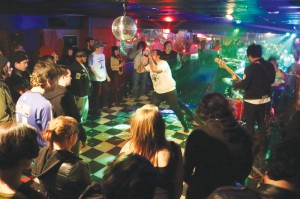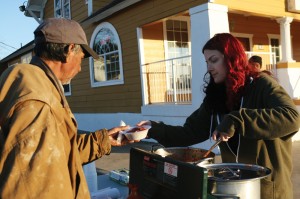Carlo Menchaca lives in a small brick house adjacent to 1919 Hemphill with his wife and two kids. When he first moved into the neighborhood, over a decade ago, he found the music coming from the venue to be obnoxious. Menchaca’s family has been in the neighborhood since 2003, when his parents bought the house in disrepair.
Since buying the modest, fixed-up home three years ago, his family has grown used to the noise next door.
“It seems like most people living in the neighborhood just tolerate it, so no one ever does anything about it,” Menchaca said.
After long days working full-time for an energy company, Menchaca hears the loud music as often as the venue has a show, so about every other night. Sometimes, the shows go on well after midnight. And while he’s never had any serious problems, he said it also attracts negative attention.
“I feel like it kind of gives the neighborhood a bad presence,” Menchaca said. “A lot of people know it’s there, and you’ve got a lot of people hanging around.”
With the rising value of the area, Menchaca said he plans to sell his house and move his family out of the city. Yet with more pressing issues, such as the potential crime and loitering at the nearby corner next to Eddie’s –– along with the frequent loud music –– that might be a hard sell.

As a family man, however, Menchaca said that 1919 provides an outlet for youth culture. As he understands it, it’s supposed to help kids stay off the street, and that’s a good thing.
Other neighbors have similarly mixed reactions to the space.
David Frisby, a lawyer based in the old yellow house next door to 1919 since 2009, said he used to have an issue with the bands practicing next door during business hours. Frisby handles personal injury cases and traffic tickets.
After he talked with the venue’s volunteers, they changed their rehearsal schedules. Since then, there hasn’t been much of a problem as far as noise is concerned, he said. The two neighbors have a mutual understanding.
While concerts are usually held after business hours, Frisby said the venue’s presence doesn’t negatively affect his business. It may even help him grow his customer base, he said.
If anything, Frisby said that the biggest problem is the people loitering at Eddie’s right next door.
While Frisby said that he just wishes that the crime rate goes down with redevelopment, Menchaca hopes the city can invest in more property on his side of Hemphill. It’s only a matter of time, said Menchaca, who wouldn’t mind if improvements happened faster.
******
When the sun sets on Hemphill, most of the day laborers and loafers at Eddie’s drift away just as local concertgoers swarm the block. Some nights, there are at least two shows going on at a time within a few yards of each other.

1919 Hemphill is the longest-standing DIY space –– not only on the block but in all of North Texas –– by far. It’s run strictly by volunteers who handle every operation. They book the shows and even clean the rooms for nothing but the love of the music and helping out. In a way, it’s an international operation –– bands from all over the globe come to Fort Worth to play the small but colorful space.
Al Rios, a local schoolteacher and head volunteer at 1919 Hemphill, has been helping to operate the building since its early years, often operating the calendar and paying the rent. When 1919 opened, most of the South Side was not affluent, which allowed for a group of volunteers to get the venue off the ground in 2002.
1919 is just a house over from Eddie’s. Sometimes, the corner regulars make their way inside to see a show or ask for change, but Rios said that it’s not a big issue. Aside from the occasional complaint from a band or showgoer, Rios maintains that the venue is open to all, sticking with the words graffitied above the venue’s doors: “Unity Through Diversity.” This is one of 1919’s many creeds. More often than not, no one is turned away at the door, unless there’s good reason.
“As long as you’re not being mean or sexist or whatever, then you can just hang out at 1919 if you want,” Rios said.
Rios grew up on the South Side and isn’t oblivious to the coming changes: The new businesses, condos, and offices all seem to be creeping up on his labor of love. When the redevelopment started on Magnolia, “it was the beginning of the end” for Rios. When it stopped about a block north near Allen Avenue, he was enormously relieved.
But Rios knew that it didn’t mean the end of the changes. He keeps track of the rising real estate prices via the Tarrant Appraisal District’s website. Since the venue opened its doors, the value of the surrounding land has almost doubled: going up by $21,000 between 2010 and 2014. As 1919 gets by with money from events, merchandise, and donations each month, the space, Rios said, will stay open as long as rent is affordable.
But he worries that the growing attention being paid to the bar across the street may create problems for his collective-run endeavor and the neighborhood in general.
Since 1912 Nite-Club began hosting local and touring acts, there’s been more activity in the area than ever before.
“The first time I went in there, I thought, ‘This is the physical embodiment of the gentrification of Fort Worth,’ ” Rios said. “It’s a primarily Mexican bar, you can smoke inside, there are pool tables and TV with soccer or something playing –– and a bunch of white kids.”
Yet for 1912 Nite-Club owner Maria Angelica Rodriguez, business is just fine.
Rodriguez bought the bar 10 years ago, when she was tired from working full-time for a real estate company. She said that the stress from her day job left her exhausted, so when a friend approached her about purchasing the bar, she decided to invest her time and money. The bar primarily served the Hispanic community for several years.
“When we first opened, we got plenty of business with the locals,” she said. “Of course, we’ve also had our ups and downs.”
Last year, Rodriguez was thinking about closing the venue and moving out when a few music promoters affiliated with 1919 approached her about booking shows. That’s when business really started picking up –– and she found new opportunities.
“They made me a part of their community, which I’m very thankful for,” she said. “Now things are much better here.”
Rodriguez said she hopes to improve the club, which needs some touching up. Ultimately, she wants to make it more comfortable for new customers.
As for the redevelopment of the area, she only sees it as a chance to get more feet through the door. From here, it seems, things can only get better.
Although, with the two venues –– plus Happi Haus at 1921 Hemphill that sometimes hosts shows –– Rios said there just may be too much attention focused on the area. In the past, he and the other volunteers at 1919 have occasionally had to deal with noise complaints, which Rios and company were able to reduce to a minimum. Now there’s at least twice the amount of noise.
Rodriguez, however, is optimistic, even while she’s felt the side effects of the rising land values. Just a few months ago, her rent went up. Still, she said she’s confident about the future. For her, it’s all about cooperation.
“If we communicate and unite our voices, then we will be heard regardless,” she said.
But despite the colorful mix, Rios said that trouble is brewing. While the rest of the South Side continues its economic growth, this particular intersection is a virtual culture clash –– where punk rockers from the clean-cut suburbs mingle with street laborers enjoying a drink after a hard day’s work and panhandlers who spend their dreary days on the corner.
“There’s going to be sometime in the near future when someone with a nice house will live right behind 1912,” Rios said. “And that’s not going to go well.”
Back at the Eddie’s parking lot, King and other regulars hang around because they seem to have nowhere else to go. King is well known to patrons who frequent the nearby venues but not always necessarily on the best of terms. He’s definitely got a reputation around here, but he’s also trying to get better. With all the “civilized people” coming around, he said, things are really changing.
Today he’s dressed in a white button-up shirt and black shorts, and he’s just trying to take advantage of his job opportunity. He hopes to one day settle down, possibly start a family and maybe even get a nice home of his own.
Now that things are shaping up in the ’hood, he sees it as something from which he and his neighbors can benefit. If the city redevelopment is not an opportunity, at least it’s a sign for him to improve his life. That’s how he sees it, anyway.
“It’s a good thing, you know,” King said. “It’ll clean up all this stuff. People will be forced to get their crap together.”











